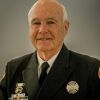Being a company officer can be the best of both worlds. You have authority and the responsibility for your crewmembers, yet at times, everything feels just like when you rode the apparatus as a firefighter.
Making the transition to the right seat is a big step, particularly as you come into your new role as crew leader. Depending on the size of your department, you may have changed stations or unit days. You may know some of your crew or you may have met them for the first time. Regardless, it is essential that you establish yourself as the leader – and then lead by example.
Complete the form on this page to download a one-page guide on this topic to share with the up-and-coming company officers in your department.
These early days will be a dance of sorts – you learning the strengths and weaknesses of each individual and the crew trying to understand your expectations, goals and leadership style. The outcome will hopefully be a strong team that understands that their combined capabilities, especially on the emergency scene, makes for the best results.
Let’s review some of the critical components of the company officer role, and offer some essential advice for those stepping into this key role for the first time.
Preparation comes in many forms
Let’s back up a bit and acknowledge that your preparation to become a company officer started with the first day you reported to the station as a probationary firefighter and progressed each time you trained, discussed or responded to an emergency. You likely learned a lot from your first officer as you observed their decision-making style, good or bad.
Most good officers can spot talent – those firefighters who can handle a gradual increase in responsibility – and slowly gave them opportunities to broaden their knowledge. Were you one of these talented individuals getting a little extra attention and responsibility?
Your experiences as a firefighter, plus additional training such the Fire Officer 1, 2 and 3 courses, laid the groundwork for your promotion to lieutenant. These experiences and training underscore the fact that a company officer is more than the person who leads the charge at a fire; they are also the person who tackles administrative and personnel issues. In fact, most company officers quickly realize that the latter tasks are harder task than the fire and rescue incidents.
Many departments allow experienced firefighters who have completed some officer training to also be designated as a senior firefighter, sergeant or, in other cases, an acting company officer (ACO) to fill the officer’s spot when the department is short-handed. This experience is invaluable, especially when it comes to some exam or interview questions. It also gives other officers a chance to observe you under several situations, including how well you adapt on the fly, and offer feedback.
Promotion readiness
Whatever the process in your department, your first promotion probably brings with it both excitement and trepidation: Will you live up to the expectations of your crew, your station captain and your chief? Do you have the confidence and proficiency to handle the job, yet the humility to acknowledge when you’ve made a mistake?
Are you comfortable with your assignment? For example, do prefer being in charge of an engine, ladder or rescue yet you’re starting on one that isn’t your favorite? The question really becomes, “Do you feel competent with the role you’ve been assigned?” Do you know what you are expected to do on the emergency assignment as the first- or second-due engine, first-due ladder or rescue company?
No matter what the scenario, it’s essential that you accept your responsibilities, ensure you are able to complete your duties, and own the role.
Taking charge
Your roles can change in a heartbeat. For example, as the first-arriving company officer in the absence of a higher-ranking officer on scene, you must assume command in a manner that lets everyone else know the situation and what is expected of them based on your initial size-up, strategy and tactics. Those first five minutes on the scene as the incident commander (IC) can seem like an eternity until relieved. Remembering who is responding with you, what you need now, and who can you call on for assistance is all part of the equation.
Depending on the size of your crew, or the order in which you arrive, you might also be plugged into a support, staff or operational role. Whatever the assignment, a good company officer uses each challenge as a new learning experience.
Early in my career, a great chief told me, “Did the fire go out? Did anyone get hurt? The rest means you train on what will make you better.” This may be oversimplified, but his words have stuck with me, and they are the same words of advice I’ve given countless new officers.
Good to great company officers
All of these skills make for a good officer, but what makes a great officer? It’s the “people skills” in the administrative and personnel areas.
What may be hard to understand is that as the company officer, you represent the chief and the administration of the department to your firefighters. You may not personally agree with a decision that has been made from above; in fact, if given the opportunity in private, you may be allowed to express those reservations to the chief, but once their decision is made, it becomes your decision as well.
Simply put, you are the voice of the chief on everything, including standard operating procedures (SOPs) department policies and discipline. Your words may say one thing, but your actions in enforcing those standards are critical. Your firefighters will more readily follow your actions over words, and they will use those examples both for and against you when they evaluate how well you lead.
Mentoring matters
In today’s world, mentoring is one of those lost people skills. Mentoring is not just recognizing talent in individuals; it is more in helping develop those talents for both the individual and the department. Never forget that someone once saw a spark of talent in you and helped develop you into the officer you are or are working to become. It is important for us to pass on that opportunity to our own people – to help them find their “gift” that will make the department better.
Fire service ‘gurus’ help
Some of the most gifted people I know are not officers and probably don’t want to be. These are the gurus of our profession – for example, those who excel in technical rescue, specialize in hazmat response or who know the ins and out of fire investigation, and the list goes on. A tip for officers: When working at incidents that require this level of expertise, it is best early on to take the advice of the expert when formulating your action plan.
Servant leadership
Cynics may scoff at the concept of servant leadership, but the best officers practice it and understand why it is important to their firefighters. Servant leadership is not a simple task. It involves honing your people skills, caring, mentoring, commitment and perseverance, all while balancing your “firefighter family” with the needs of your own family, including your personal time for relaxation and growth.
Is it easy juggling all of these requirements while trying to maintain work/life balance? The answer is a resounding “No!,” but it is why being an officer is not for everyone. Whether you like it or not, you have become a role model to your firefighters, and a person whom they want to respect and know that you have their back. That is why they respectfully call you “Lieu,” “LT” or “Cap.”
Being an officer is more than just pinning on a badge with one, two or more bugles. It is a sign of an unbreakable bond that should exist between you, your firefighters and your superior officers.
You are where all the policies, training and actions of the department come together. Being a company officer is where the rubber meets the road.
Stay safe!














